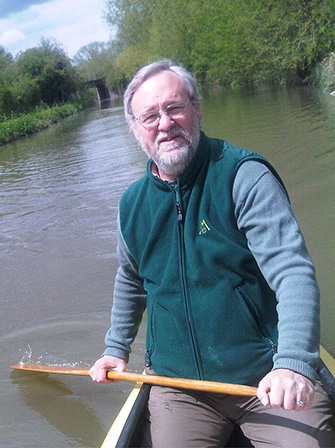
John has engaged people with mathematical thinking ever since he was asked at the age of 15 to tutor a fellow student. He studied Maths and Physics at the University of Toronto, then did a Master’s degree in Logic before going to the University of Wisconsin to work in logic. The staff there decamped before he could get started so he switched to Group Theory, and then to Combinatorial Geometry.
On completing his PhD thesis, he came to Europe, got a lectureship at the Open University six months after it started hiring, and stayed there until he retired 40 years later. During that time, he designed and implemented several mathematics summer schools, was trained in radio and TV presentation by the BBC, and implemented the use of audio tapes in conjunction with printed frames as a precursor to what seemed to be on the horizon – which are now implemented as Massive Open Online Courses (MOOCs). Around 1980, he shifted into preparing mathematics education courses designed for teachers, teaching assistants and Master’s students, and was de facto director and then director of the Centre for Mathematics Education at the Open University for 15 years. When NCETM began, he initiated the Mathemapedia as a resource for teachers and Master’s students.
His interests have always been in mathematical problem solving, especially supporting and stimulating people who themselves want to foster and sustain mathematical thinking in their students. Specific topics which have occupied his attention include the use and role of mental imagery in learning and doing mathematics; the use and abuse of word problems in teaching mathematics; the principle of variation in mathematics; the role of frameworks of constructs for informing pedagogical choices in mathematics; articulating a research paradigm for people who wish to research their own practice within a caring profession such as teaching; and the nature and structure of attention when learning and doing mathematics.
In retirement, he continues to work on mathematical problems arising from pedagogical situations as well as from mathematical enquiry, writing applets in order to illustrate or support his thinking which might be of use to others.
1. What’s your earliest memory of doing mathematics?
When I was about 8 (it was the Queen’s coronation), I recall bouncing on my parents’ bed answering questions from my father about powers of ten. My father reported that when I was a bit younger, I called out from the back seat of the car, looking out the back, that the world was “going away.” He decided I would be a scientist. I recall that when I was 10, I was dragging sand for iron filings with a magnet in the ditch at the front of our house at the time of Dien Bien Phu, resolving to myself that I would become a scientist so that I wouldn’t have to go to war. I recall a New Year’s Day, when I was about 14, trying to find cube and fourth roots of unity (in total ignorance of de Moivre).
2. How has mathematics education changed in the time you have been involved in it?
When I started, about 1982 or so, it seemed almost mandatory that a thesis should begin with an exposition of Piaget. Vygotsky began to be quoted. Then constructivism swept through, starting with a simple version based on Piaget’s genetic epistemology, then bifurcating into radical and social constructivisms, with constructionism and enactivism as variants. Then people tried to convert these perspectives or assumptions about the human psyche into ways to teach, which to my mind was a major error and misunderstanding of what the perspectives were actually offering. There have been further tidal waves rushing through mathematics education, usually, in my view, because people hope that the next wave will resolve everything and transform teaching into a universally effective practice. To think this possible is another misunderstanding of human beings, in my view.
3. Tell me about a time in your career when something totally flabbergasted you.
A friend and colleague ran a Saturday conference with secondary mathematics teachers who reported that science teachers claimed that students told them that they had never been taught about ratio, when the mathematics teachers knew that all students had been taught ratios previously. I recognised a phenomenon – that I will not admit to having been taught something when asked, in case I am then tested, possibly beyond what I remember. This initiated my move into mathematics education.
4. Do you practise mathematics differently in company?
I would like to think so. I work at listening to others and trying to find questions which will reveal what they are attending to, and in what way, and perhaps lead to attending differently when appropriate. I am, however, prone to getting excited and wanting to tell people things I have come across.
5. Do you think a brilliant maths teacher is born or made?
Made. Becoming a teacher is a lifetime process of developing a teacherly-self, through continuing to think and learn mathematically, and through becoming aware of aspects of the human psyche which enhance and inhibit that thinking. Put another way, learning to balance care for learner(s) and care for mathematics.
6. What’s the most fun a mathematician can have?
Discovering and articulating an unsuspected relationship between two or more apparently disparate ideas or ways of thinking. It has much in common with the placing of the last few pieces in a jigsaw puzzle, except that in mathematics the puzzle is never really finished, because it can always be extended, varied, abstracted or generalised.
7. Do you have a favourite maths joke?
I have always liked:
Why did the cat slip down the tin roof? Not enough mu.
On a SAT, asked to show their working, a child drew a picture of a person at a table, “working.”
Join the conversation: You can tweet us @CambridgeMaths or comment below.